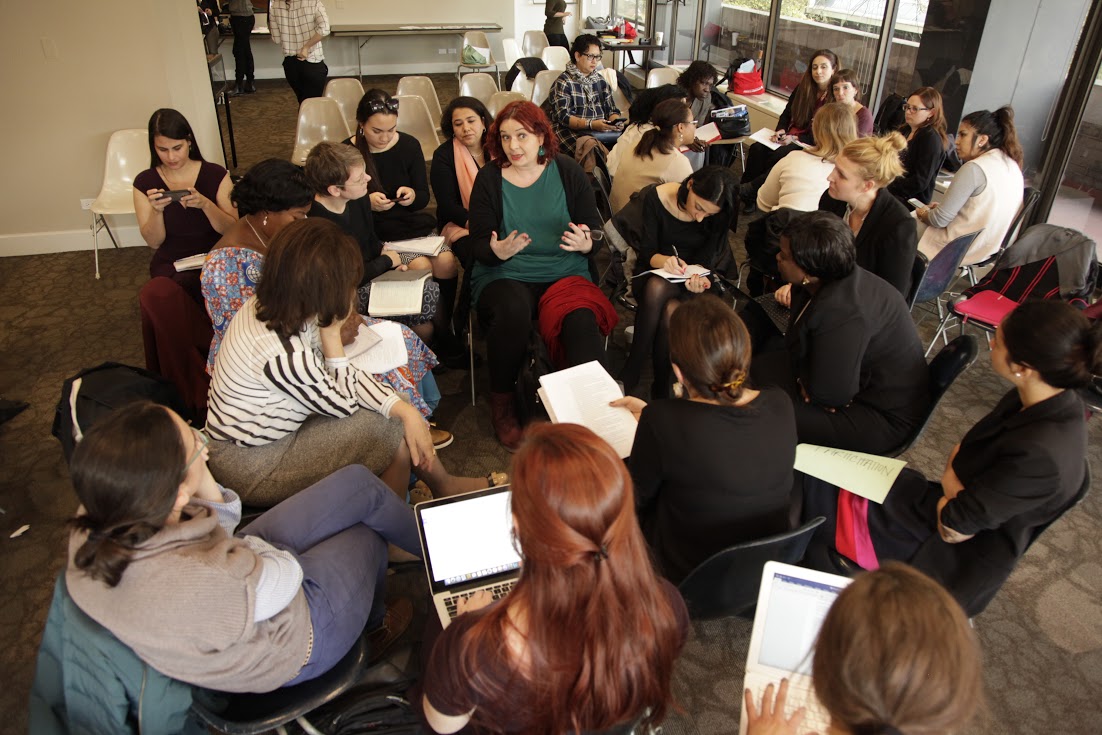October and Beyond: Shifting the Gaze from Government and UN to #FemDefenders as Builders of Peace
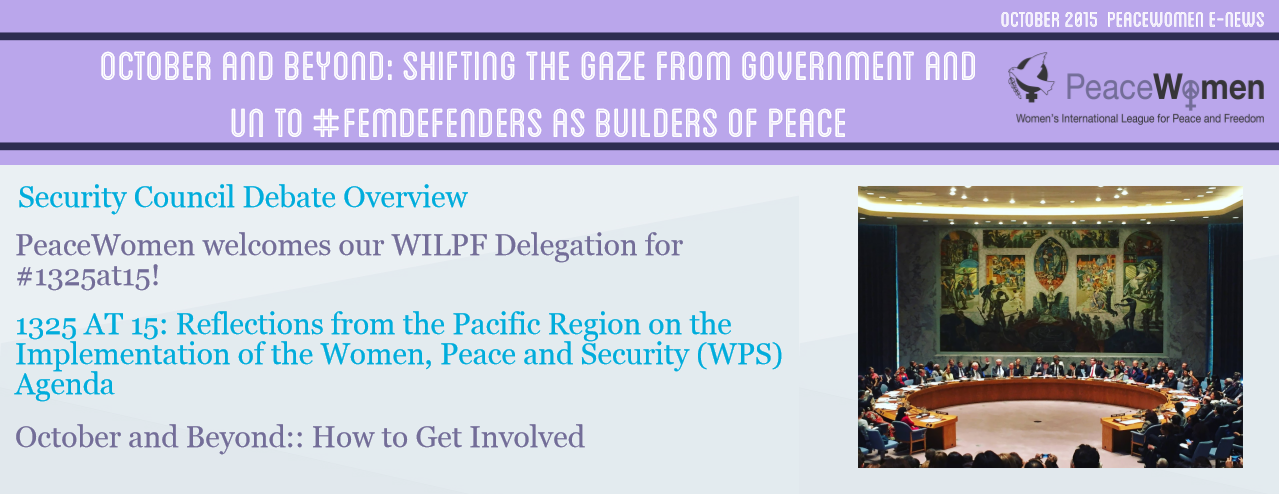
October and Beyond: Shifting the Gaze from Government and UN to #FemDefenders as Builders of Peace
By PeaceWomen Programme Manager Abigail Ruane
This October marks the 15th anniversary of UNSCR 1325 and the Women, Peace and Security Agenda. And what a month it has been! PeaceWomen has led WILPF’s work in mobilising across the full month to build momentum for feminist foreign policy that goes beyond anniversaries and promotes local action for transformative change.
Photo of the Prelude to the Peace Forum by Evan Roberts
The Security Council debate on Women, Peace and Security on 13 October was notable on multiple accounts: not just one but three civil society speakers made powerful interventions; a record number of states (110) made statements; and a record number of co-sponsors co-signed UNSCR 2422, the now 8th resolution on the Women, Peace and Security agenda. Building on the roadmap published by the NGOWG on WPS, the new resolution calls for strengthened collaboration with civil society; it also calls for gender integration including regarding the issue of countering violent extremism. At the launch of the global study as well as at the debate, States also shared commitments intended to strengthen implementation.
Yet other than strong words, what has changed? At our discussion with global study author Radhika Coomaraswamy on 15 October, one participant commented, “we are still spending pennies for peace but trillions on war.” Even in the commitments made by States, many simply shared existing allocations rather than new money, and a concerning number committed to investing in countering violent extremism rather than the Women, Peace and Security Agenda more broadly. This is particularly concerning given that violent extremism and terrorism are militarised agendas that risk actively undermining feminist movement building and peace work through redirection of funds and further curtailment of civil society space.
In conversations across this month, activists have repeatedly brought attention to the need to shift the gaze from the United Nations and governments to feminist grassroots peacebuilders – nonviolent women and men – as key to peace. Last week, WILPF’s international delegation, which hailed from nine countries, joined women and men from over 40 countries in New York around conversation circles aimed at mobilising collaborations for the feminist peace agenda.
Together, we have called for action to engage in both inside and outside strategies to create change; to create learning institutions that strengthen feminist movements; and to diversify tools beyond policy, including media, education, and financial investment. We have taken action to strengthen feminist networks including between women-led civil society and men’s movements in order to strengthen action to address gendered and patriarchal power structures and prevent all forms of violence.
The Global Study has given us indisputable evidence that women’s participation and rights are both human rights obligations and foundational for sustainable peace. Governments and the UN have an obligation to remove barriers to realising these rights.
Now it is time for action. How will you be an ally?
Join us! This is just the beginning.
Security Council Debate Overview
By: Federica Dall’Arche, Security Council Monitor Fellow
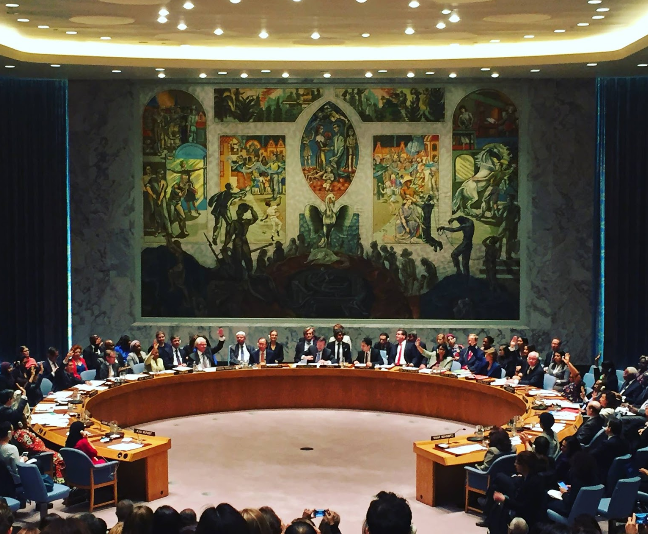
Photo by: Ghazal Rahmanpanah
On Tuesday (13 October 2015), under the Spanish presidency of Prime Minister Mariano Rajoy, the Security Council held a ministerial-level Open Debate on Women, Peace, and Security (WPS). The debate marked the 15th anniversary of the WPS Agenda and the adoption of UNSCR 1325 (2000), a resolution that, for the first time, acknowledged the gendered impact of conflict, specifically on women, and the imperative need for inclusion of women in the maintenance of peace and human security.
Member States renewed their commitments, described their achievements, and some focused their statements on how to improve the implementation of UNSCR 1325 and the WPS Agenda, which, after 15 years, remains unfulfilled, addressing the most common obstacles and constraints encountered.
The debate also functioned as a forum for the Council and Member States to reflect on the recommendations emanating from the 2015 Global Study on women, peace and security and from the Secretary-General’s 17 September report on the issue.
A record breaking 110 statements were made from Member States, some of which included commitments for moving the Agenda forward. Following three extraordinarily effective statements by the president of the Organization of Women’s Freedom in Iraq, Yanar Mohammed, by the head of Solidarité Féminine pour la Paix et le Développement Intégral, Julienne Lusenge, and The Voice of Libyan Women’s Founder Dr. Alaa Murabit, the Council unanimously adopted UNSCR 2242, which was co-sponsored by over 75 states.
As part of WILPF’s action surrounding the 15th anniversary of UNSCR 1325 and the Global Study on 1325, PeaceWomen has released a brief guide to the Secretary-General’s Report on Women, Peace and Security, as well as a record of commitments made during the Open Debate.
For more information, please see our Overview of the Secretary General’s Report and a compilation of commitments made by Member States during their statements. Please stay tuned for our comprehensive analysis of UNSCR 2242 - the new member of the WPS Agenda!
PeaceWomen welcomes our WILPF Delegation for #1325at15!
By: Marta Bautista, Local to Global Intern, and Cynthia, Communications Intern
“We need to move from global to local to make women’s perspective seen on an international level.” Manuela Mesa, Vice President, WILPF Spain
From 19th to 23rd October, WILPF PeaceWomen hosted a delegation from our WILPF sections in New York, who joined from nine countries: Cameroon, Colombia, Democratic Republic of the Congo, Lebanon, Nigeria, Spain, Sweden, the Netherlands, and the United Kingdom. Delegates participated in civil society events surrounding the 15th Anniversary of the UNSCR 1325,the High Level Review of the UNSCR 1325 and the launch of the Global Study.
During the week, the delegation strategised in an internal WILPF workshop, “Mobilizing women, localizing peace,” shared information on good practice in overcoming challenges from different country situations, and contributed to a variety of events and meetings aimed at building momentum across the month and beyond October for change.

The WILPF delegates and the PeaceWomen team during the workshop ”Mobilising women, localising peace”. CCUN building, October 20th, 2015.
As one part of this engagement, WILPF delegates participated in and facilitated conversations circles at our event, the Prelude to the Peace Forum, aimed at creating space to mobilize civil society and consolidate key recommendations for the UN, governments, and other key stakeholders on the 15th Anniversary of UNSCR 1325. With activists from around the world, participants engaged in enriching discussions about inside and outside strategies for making change in key gap areas including: holistic agenda, prevention, participation, violent extremism, financing, engaging men and boys, and outsider strategies.
On Thursday 22nd October, Katherine Ronderos, of WILPF Colombia, spoke on the impact of weapons proliferation in Colombia, following over six decades of conflict, and explored the importance of disarmament and demobilisation efforts in post-conflict Colombia on women, during an event by WILPF Reaching Critical Will, “Arms Trade Treaty, UN Programme of Action, and Gender-Based Violence.” The event addressed discussed the importance and challenges of creating synergies within implementation of disarmament agreements to address gender based violence
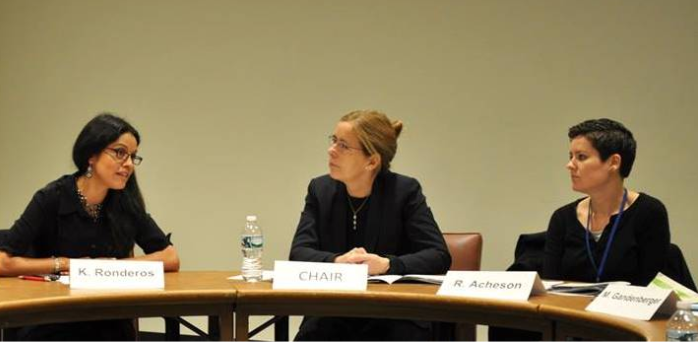
From left to right: Katherine Ronderos, President of WILPF Colombia, Ambassador Susanne R. Hækkerup (Denmark) , and Ray Acheson, Director of Reaching Critical Will. UNHQ, October 22nd, 2015.
On Friday 23rd, at 4pm, PeaceWomen hosted our final lecture series on Women, Peace and Security, entitled, “After the High Level Review - Connecting Local and Global Action to Implement the Women, Peace and Security Agenda.” At the event, Former UN Women Peace and Security Chief, Anne Marie Goetz, reflected on how the Women, Peace and Security agenda is a political agenda which cannot be implemented without addressing militarised power structures. WILPF-Nigeria President and WILPF International Vice President Joy Ada Onyesoh shared a field-perspective that highlighted the importance of recognizing and supporting local women peace builders - such as the over 7,000 women WILPF Nigeria has trained in the last 2 years on using UNSCR 1325 to strengthen women’s economic empowerment and combat gun violence in their communities. Joy reminded the international community of the importance of recognising and strengthening women’s local work.
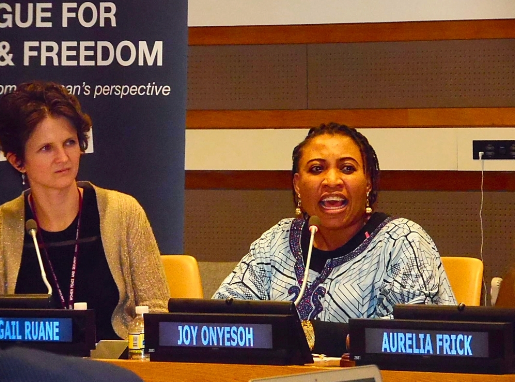
From left to right: Abigail Ruane, PeaceWomen Programme Manager and Joy Ada Onyesoh, Vice-President of WILPF and President of WILPF Nigeria. UNHQ, October 23rd, 2015.
Happy and satisfied with the week, but sad because it was already over, the delegates headed home between Friday and Saturday. All in all, the outcome of the delegations’ meetings was very fruitful: they shared common concerns and strategized to work together to overcome them, always showing their passion and willingness to work on the Women, Peace and Security Agenda and to mobilise beyond anniversaries for peace.

Photo by: Mia Gandenberger
Visit the PeaceWomen website for more information on WILPF and other events and action surrounding the October 2015 Women, Peace and Security month and follow us on Facebook and Twitter to be a part of the action!
Preventing Conflict; Transforming Justice; Securing Peace, An Overview of the Official Launch of the Global Study
By: Charlette Lopez, UN Monitor Intern
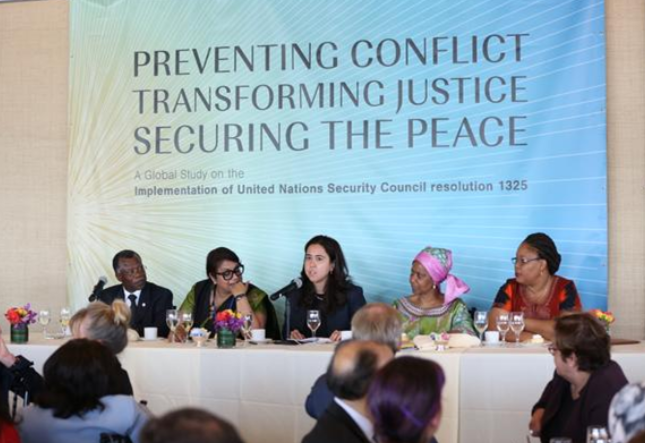
Photo by Ghazal Rahmanpanah; The Global Study launch October 14, 2015
On Wednesday 14 October, the Global Study on the Implementation of United Nations Security Council Resolution 1325, was officially launched at an event co-hosted by UN Women and the United Arab Emirates. Speakers included global study lead author Radhika Coomaraswamy, UN Secretary General Ban Ki-Moon, UN Women Executive Director Phumzile Mlambo-Ngcuka, and Leymah Gbowee (Liberia) among others.
In presenting her the global study recommendations, Radhika Coomaraswamy reflected on the inclusive development of the Global Study, and drew attention to the need reduce militarism and strengthen civil society. Leymah Gbowee reiterated calls for our focus to be on ending war. She cautioned the international community to have a long view, so that our work today invests in conflict prevention and women’s leadership, so that in 15 years, “we will not be here discussing the lack of political will.”
The event then transitioned into being a donor conference, where a handful of countries and entities making financial and other commitments aimed at furthering the Women, Peace and Security Agenda. Contributors included: Australia, Austria, Estonia, Guatemala, Ireland, Italy, Japan, Netherlands, Norway, Spain, Sweden, Switzerland, United Kingdom, and also NATO. While financial commitments are critical for action, WILPF notes with concern that many were reiterations of existing financial commitments (rather than new money), and many were oriented at countering violent extremism or terrorism, which risks militarising and actively undermining the Women, Peace and Security agenda.
For PeaceWomen’s coverage of the Global Study launch on Women, Peace and Security Agenda, please see here.
1325 AT 15: Reflections from the Pacific Region on the Implementation of the Women, Peace and Security (WPS) Agenda
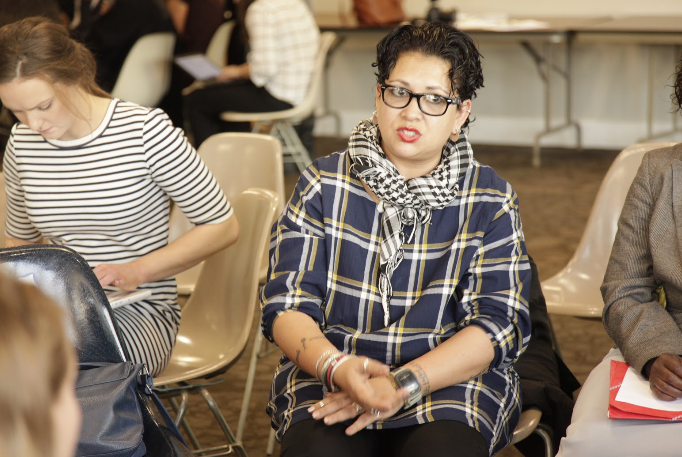
Photo by Evan Roberts, Author: Sharon Bhagwan Rolls at the Prelude to the Peace Forum Event
According to the Report, “Candid Voices from the Field: Obstacles to a Transformative Women, Peace and Security Agenda and to Women’s Meaningful Participation in Building Peace and Security,” UNSCR 1325 and its sister resolutions have become “renowned for being the most advocated and least implemented set of resolutions.”
This is hardly a resounding endorsement for the capacity of a global policy instrument meant to change the lives of some of the most marginalised and critical actors working to build sustainable, peaceful and secure communities.
Unfortunately, this is the reality in Pacific Island countries and territories where despite women and young women’s productive efforts our participation in formal conflict prevention and management and post-conflict recovery efforts, as well as oversight and accountability mechanisms for the security sector is still not fully realised.
Women still struggle to be heard at the negotiating table in leadership roles and are not given sufficient recognition and resources to do their work. Women’s voices – whether individual or collective – continue to be fundamental to advancing women’s rights at national and international levels.
The 15th anniversary of UNSCR 1325 came at a time when there is growing recognition to the changing nature of conflict and for our Pacific region, as women have been communicating that we still need to address the root causes of our region’s political fragility and insecurity and the interconnections between natural disasters, humanitarian crises and conflicts.
Women, of course have proven for more than 15 years that we are not simply vulnerable to these crises but have demonstrated leadership that must be integrated into political processes. In the Pacific this year, we convened a Pacific Civil Society Forum on Peace and Human Security, enabling peace builders to provide input for the global study.
No wonder Radhika Coomaraswamy has said “Peacemaking, peacekeeping and peacebuilding is not about men speaking to men with male facilitators but there is a radical change needed to ensure not only the inclusion of women but an investment in the leadership of women in both formal and informal processes.”
The recommendations of the Global Study are reflected in those that have been identified and refined by Pacific women through FemLINKPACIFIC and GPPAC Pacific networks during the past 15 years and we now need to hear more than just affirmations of state-centric security. We must now reassert the need for a feminist lens on the Peace and Security agenda – from the local to global.
Read the complete article by Sharon Bhagwan Rolls here.
#OctoberandBeyond:: How to Get Involved
By: Ghazal Rahmanpanah, Programme Associate
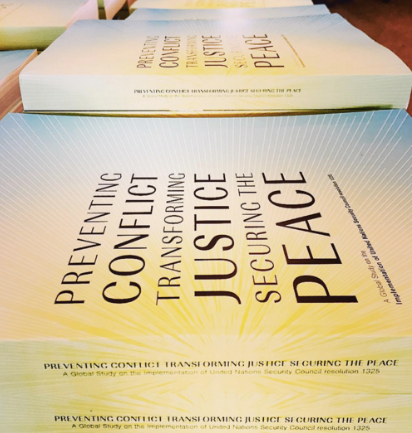
Photo by Ghazal Rahmanpanah, featured hard copies of the Global Study
Today, the Women, Peace and Security Agenda has been successful in changing the political discourse and rhetoric. However, this agenda is continuing to be undermined by the suffocation of civil society space; by attacks on human rights defenders; and by lack of accountability against governments that do not ensure women’s full and effective participation. As Norwegian Secretary of State, Tone Skögen, stated during the Global Study launch, “it’s no longer about counting the women, but making the women count.”
So, what’s next? How do we now strategize after this month of anniversaries and [High-Level] Reviews to truly keep momentum going; to reclaim the WPS Agenda; and to mobilise commitments into action?
Advocacy for Vision
WILPF section, partners, and peace advocates can pursue advocacy by localising existing resources, for one, such as the October 2015 Advocacy Toolkit. Furthermore, we must enforce better information sharing across the board. Sharing best practices across sections and with the PeaceWomen office, for example, can create strong communication channels for greater success!
Monitoring for Accountability
Through monitoring, we can hold our national governments accountable for their commitments to the Women, Peace and Security Agenda and the implementation of UNSCR 1325. Many countries made national and financial commitments to the implementation of the WPS Agenda – and if they were holistic, we must how hold them to it! Let us know how if your country is really mobilizing commitments into action. If your country did not sponsor UNSCR 2242, do not let them present themselves as human rights leaders at the Human Rights Council.
The time is now to demand action; for governments to embrace a truly feminist foreign policy; to radically shift perspectives, policies, and priorities away from militarism and towards sustainable peace; to support an integrated approach to human security and human rights; to do more than just pay lip service to the women fighting for their seat at the table. As Vice Minister Renée Jones-Bos stated in her statement on behalf of The Netherlands during the Open debate, “to quote the late Elvis Presley, Mr. President, the time has come for ‘a little less conversation and a little more action, please’.
WILPF INITIATIVES: 3 - 5 WILPF initiatives or events
NGO Working Group on Women, Peace and Security Open Letter
Launch of the WILPF Peacewomen Scorecard
Peace Forum: Strategic Re-engagements: Advancing Women, Peace and Security and Beyond
Peace forum: People's Action Plans: Empowering Civil Society to Implement 1325
Peace Forum: Transforming Violent Masculinities to Move the Women, Peace and Security Agenda Forward
Peace Forum: Feminist Roadmap for Peace
POLICY BRIEFS/REPORTS: 5 policy reports/briefs (not WILPF’s)
Global Study on Women, Peace and Security
Guidebook on CEDAW General Recommendation No. 30 and the UN Security Council Resolutions on WPS
Peacebuilding Defines our Future Now
Candid Voices from the Field
EXTERNAL INITIATIVES: 5 - 9 resources (include MAP here)
Monthly Action Points on Women, Peace and Security, October 2015
Statement by Ms. Julienne Lusenge at the UN Security Council Open Debate on Women, Peace and Security
Statement by Ms. Yanar Mohammad at the UN Security Council Open Debate on Women, Peace and Security
Statement by Dr. Alaa Murabit at the UN Security Council Open Debate on Women, Peace and Security
Fem Defenders: The Hatred Against Women Human Rights Defenders - Online and Offline
Every Woman Locked Outside Peace Talks is Another Opportunity Lost
Justice on Trial: Lessons from the Minova Rape Case in the DRC
Women Leading Peace

